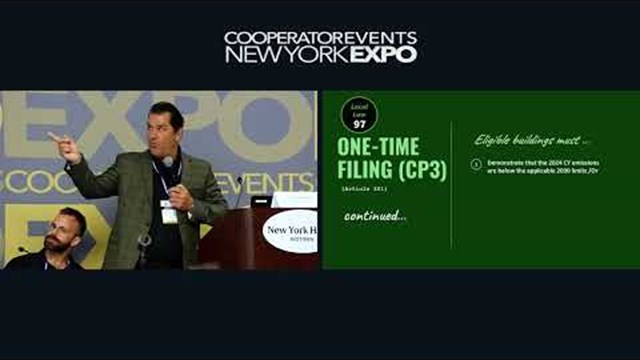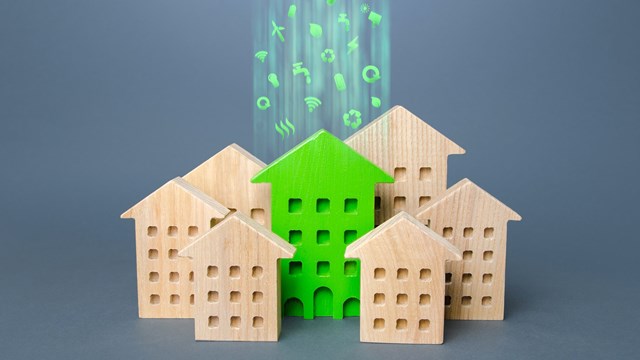In 2025, the first compliance requirements for Local Law 97 will become a fact of life for literally thousands of New York City co-ops and condos, and those who call them home. Local Law 97 is far-reaching legislation aimed at making New York City a carbon neutral environment by 2050.
Compliance Right Now
“The first compliance period for Local Law 97 has finally begun,” says William McCracken, a partner with Moritt Hock & Hamroff, a law firm based in New York City. “The most pressing item for co-ops and condos is to confirm whether they are subject to the law. They really should know this already, but if they’re not sure, New York City has a searchable list of all of the buildings covered under the law.”
“Covered market rate co-ops and condos have two main compliance responsibilities at this time,” McCracken explains. “To submit their building emissions report on time, and stay under their assigned emissions limits.”
Some buildings may be facing fines for exceeding their emissions limits beginning in 2025. What do they need to do?
According to McCracken, “They need to be doing everything they can to reduce their carbon emissions, and putting together a so-called ‘decarbonization plan’ so they can ask the Department of Buildings (DOB) to reduce or eliminate their fine.”
A decarbonization plan is a plan for reaching net zero carbon emissions by 2050, and it includes a certified energy audit, an inventory of major equipment in the building, and a list of alterations needed for compliance, including a timeline and a financing plan. “To be clear,” continues McCracken, “it’s a lot of work, and you will need a whole team to put it together. But if your building is facing fines beginning in 2025, preparing a decarbonization plan is basically the only way to reduce or eliminate those fines.”
Next Steps if You’re in Compliance
Market rate co-ops and condos that aren’t facing fines in 2025 -- which McCracken estimates is probably about 90% of those buildings -- need to make sure they submit their emissions report on time, and then work on what if anything they need to do to comply with their 2030 limits, the next big compliance phase-in year.
“For covered affordable housing owners, including co-ops with more than 35% rent-regulated apartments, communities should be working on implementing the required energy conservation measures in their building,” says McCracken, “which includes things like repairing any heating system leaks, installing individual temperature controls, and upgrading lighting to LEDs. This is a one-time requirement, and obviously a lot less onerous than doing a decarbonization plan.”
Calendar Deadlines
Time is creeping up on us for Local Law 97 compliance. The first major deadline is May 1, 2025, by which date every market-rate co-op and condo covered by the law has to submit their first annual emissions report for the year 2024. It’s also the date by which decarbonization plans are due. May 1, 2025, is also the date by which most covered rent regulated buildings and houses of worship have to submit a report showing they’ve complied with the requirement to implement all of the energy conservation measures in their building.
“All of these deadlines are important, and none should be missed,” advises McCracken. “As an example, if you fail to file your basic emissions report on May 1, you’ll be looking at a fine of at least $12,500 each month until you do.” Even for a huge co-op or condo community with very deep pockets, that’s major money.
Alarming as those fines are, there is the possibility of reducing or eliminating penalties by demonstrating good faith efforts to comply. The DOB’s rule is structured to grant non-complying buildings a two-year grace period to comply with their emissions limits. The law also has provisions to grant extensions for financial hardship, but the DOB hasn’t released any rules on that yet. “I expect that rule to be released in the next few months,” says McCracken. “The consistent line in all of the requirements is that if they want assistance, the building must demonstrate ‘good faith efforts’ to comply. Their ownership - whether rental, co-op or condo - will not be able to just throw up their hands and say, ‘It’s too hard to do anything,’ and expect relief.”
Sage Advice
Daunting as compliance requirements and fines for noncompliance may be, “Don’t bury your head in the sand and hope all this goes away,” says McCracken. “It’s not going away. Most of these deadlines and requirements are relatively straightforward for 90% of the buildings covered by the law - at least for the first five years - but now is the time to set up your team, connect with the New York City Accelerator, and develop a plan of action. If you’re one of the buildings that is facing a fine in 2025, you need to already be working on your decarbonization plan, or at least starting on one as soon as you read this.”










Comments
Leave a Comment